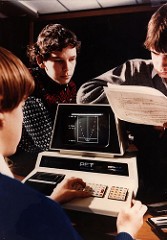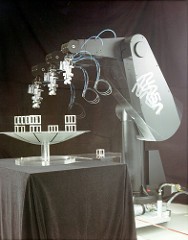Will Wood, a librarian at State Library of Queensland, gives his thoughts on libraries in the future
Twenty years ago in 1997 the world had never heard of Google, Wikipedia or peer to peer file sharing. Amazon and eBay were fledgling tech companies in a newly created online marketplace. Wi-Fi had just been accepted as the standard for wireless connectivity and the first iPhone was ten years from being released.
In just two short decades these and many other advances in commercial, industrial and personal technology dramatically changed the way that we interact with one another and the environment in which we live.

Computing in the 1970s, Reference 5417/353/4, Tyne & Wear Archives & Museums
So where will this technology boom lead us twenty years from now?
The late 2030s may see the creation of technology so advanced that it will allow humanity to communicate directly with these sensors in the environment, to interact with computer systems wirelessly, to share thoughts and memories through brain to brain communication and access the internet all through mind-machine interfaces.
We are on the verge of a technology that was once just a plot device in science fiction. Devices will become integrated with our bodies and consciousness, improving our health, wellbeing and physical fitness, lengthening our lifespan and even augmenting our intelligence. These potential applications will raise a myriad of questions relating to morality, privacy, security and what it means to be human.
It is not only the intelligence of humans that will be impacted by rapidly advancing technology. Machine intelligence, artificial intelligence (AI) and machine learning have been heralded as technologies that will change the face of commerce and industry more dramatically than the advent of electricity did during the second industrial revolution.

(April 2, 1990) The Puma Robotic Sensor Arm for use in Virtual Reality development and studies at the NASA Ames Research Center, Mountain View, California. NASA on The Commons, Image # : AC90-0187-1.
The future of libraries, as with the rest of the modern world, will be one of connected technologies, embedded networks and streamlined, personalised services. Libraries will continue to transform themselves to keep abreast of changing digital environments and will increasingly implement intelligent systems to automate processes and procedures.
Throughout 2017 SLQ explores the theme of Digital Futures. In the Digital Futures Lab you can immerse yourself in virtual worlds, learn mindfulness from a machine and share your dreams and predictions of the future.
When confronted with technologies like artificial intelligence it is easy to think that the library of the future, or any customer service industry for that matter, will create artificial experiences in automated, dehumanised environments where peripheral systems tell us what we want before we know we want it.
I personally feel however, that despite the inexorable march towards pervasive technology that will inevitably change the appearance of library services and spaces, the core focus for libraries over the next twenty years and beyond will remain unchanged.
Libraries engage communities, enable access and empower users to enrich their own lives through learning. Artificial intelligence will not replace human interactions – it will just be a new platform that can be used to enhance our understanding of information we already know. The cover of a book may change when it is reprinted but the information inside remains the same.
The digital age has really only just begun, but what good is all the information we now have access to if it cannot be effectively converted into knowledge and applied in ways that enrich our lives?
It is for this reason that libraries will cease to be just an archive of our history and a record of our present but will grow to provide individuals with the means to shape our collective future.
Come and explore the future here at State Library through our Digital Futures Lab in the SLQ Gallery on Level 2, a free interactive experience which is part studio, part game space, and part exhibition.
Open 10am – 5pm every day until the 5th Nov 2017.
Further reading
A history of the Internet and the digital futurehttp://onesearch.slq.qld.gov.au/SLQ:SLQ_PCI_EBSCO:slq_alma21119450750002061
Budinger, Thomas F.; Budinger, Mirriam D. Ethics of emerging technologies : scientific facts and moral challenges. Hoboken, N.J. : John Wiley & Sons, 2006. http://onesearch.slq.qld.gov.au/SLQ:SLQ_PCI_EBSCO:slq_alma21120806860002061
Meijer, Gerard; Pertijis, Michiel; Makinwa, Kofi. Smart Sensor Systems : Emerging Technologies and Applications. Somerset : John Wiley & Sons, Incorporated, 2014. http://onesearch.slq.qld.gov.au/SLQ:SLQ_PCI_EBSCO:slq_alma21206580960002061
Kipper, Greg; Rampolla, Joseph. Augmented Reality : An Emerging Technologies Guide to AR. Saint Louis : Elsevier Science, 2012. http://onesearch.slq.qld.gov.au/SLQ:SLQ_PCI_EBSCO:slq_alma21206448360002061
Behmann, Fawzi; Wu, Kwok. Collaborative Internet of Things (C-IoT) : For Future Smart Connected Life and Business. Somerset : John Wiley & Sons, Incorporated, 2015. http://onesearch.slq.qld.gov.au/SLQ:SLQ_PCI_EBSCO:slq_alma21206758180002061
More information
/whats-on/events/digital-futures
Digital Futures Lab - /resources/educators/learning-notes/digital-futures
Ask Us service - /services/ask-us
Will Wood
Librarian, Information Services
Comments
Your email address will not be published.
We welcome relevant, respectful comments.